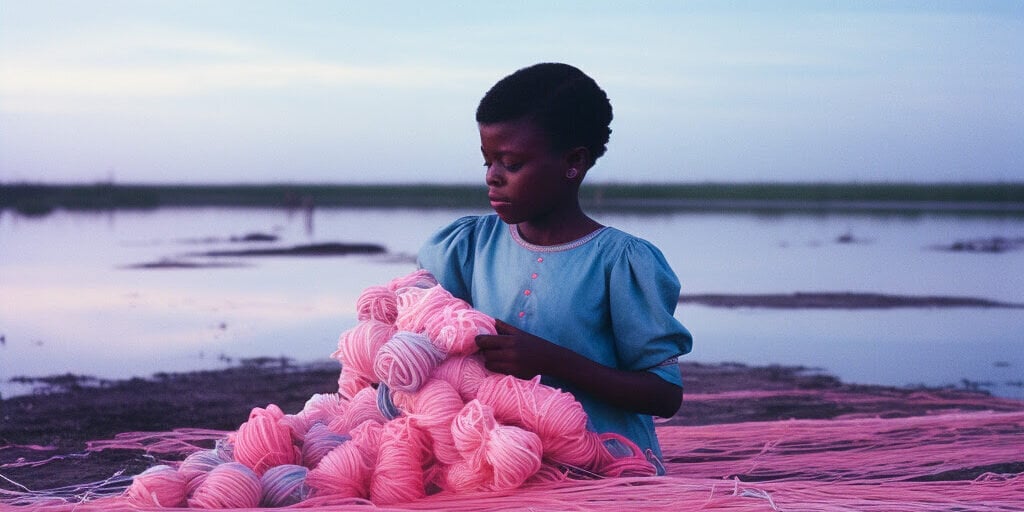Can artificial intelligence see people of color? Senegalese artist Linda Dounia Rebeiz explores this thought-provoking question in the upcoming online exhibition she curated, IN/Visible, opening this Monday on Feral File.
It features 10 black artists, including Dounia. The lineup showcases Jah., Serwah Attafuah, Adaeze Okaro, Minne Atairu, Linda Dounia, Zoe Osborne, Arclight, AFROSCOPE, Nygilia and Rayan Elnayal.
These artists share the common goal of shedding light on the biases of AI when it comes to representing people of color. “The biases of AI, the biases of the internet, and the biases inherent in Western art history compound to create an environment where people of color, including black people, feel either absent or misrepresented by AI,” Dounia told Decrypt.
As a multidisciplinary artist, Dounia minted her first NFTs in 2021. Her work draws inspiration from her personal experiences as a woman growing up in Senegal, where she witnessed significant transformations due to environmental change and globalization.
Dounia makes use of AI in her work, collaborating with Generative Adversarial Networks (GANs) and training them using her own collected data from her environment and artistic practice.
“When you input a search term like ‘human’ into AI platforms like Dall-E or Midjourney, the results are skewed,” she said. “You are more likely to find images of white men. However, when you search for ‘black person,’ the AI-generated results are often distorted, either in the facial features or body proportions.”
“Perceived” by Serwah Attafuah
Dounia explained that AI frequently relies on stereotypes in its representations. “It’s apparent from these outputs that AI doesn’t fully understand black people, their origins, or their contexts,” she said.
These issues are highlighted by the artworks featured in the exhibition. While Dounia blurs the entire face as a rejection of AI’s output, Arclight incorporates the distortions into their pieces, resulting in hazy and ill-defined images.
On the other hand, artists like Minne Atairu and Serwah Attafuah create aesthetically pleasing works with well-defined faces and lighting, but upon closer inspection, inconsistencies in the representation of hair become apparent.
Zoe Osborne uses filters to blur out inconsistencies, giving her portraits a vintage look that represents her perspective on AI’s fidelity in representation. Jah takes a different approach by embracing AI’s imperfections and utilizing them to create surreal characters inspired by African masks and ancient Egyptian attire.
“The Idunnos, #45” by Jah
This activist approach is strongly advocated by Linda Dounia, who believes that these questions must be raised. “AI is not created in an apolitical vacuum,” said Dounia. “It’s people who create the algorithms, interfaces, gather data and use it to train the algorithms. If these people are not aware of the issues, we can’t correct the bias.”
Furthermore, launching an NFT exhibition exploring those issues is also a way to spread a message within the Web3 ecosystem, often wrongly represented as an apolitical space. “I was a little apprehensive about the reactions when I started curating, but so far, it has been well-received,” said Dounia.
“Confetti, #7” by Nygilia
Moreover, the artist emphasizes the importance of uplifting and empowering black artists, as they play a crucial role in addressing this issue. “If more black artists begin utilizing the tool to provide contextual references, they are actively contributing data to rectify the flaws,” she explained, noting that this collective effort can lead to a more inclusive representation of cultural references in a democratic manner.
For the first 24 hours following the exhibition’s opening at 14:00 UTC on 12 June, collectors will have the opportunity to acquire sets including the 10 artworks showcased at the event for 0.55 ETH per set.
After this limited period, individual artwork editions will be made available for purchase at 0.055 ETH per edition.




